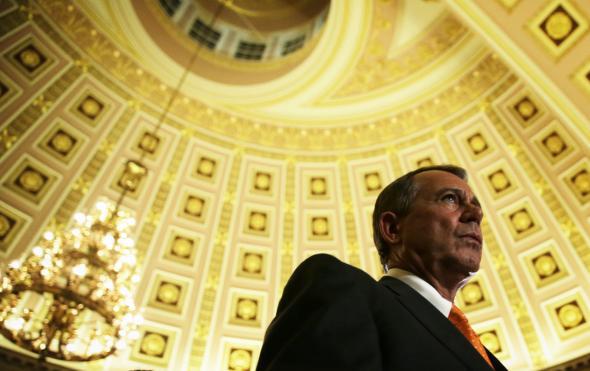Now that the government has been officially reopened, we have a triple series of dates to guide the federal tax and spending course ahead.
- There will be a bicameral conference committee that is supposed to produce a proper budget outline by Dec. 13.
- Then the continuing resolution that funds the government will expire on Jan. 15.
- Then the statutory debt ceiling has been suspended through Feb. 6.
In a place called Fantasy America where the parties sit down around a big table and hash things out, this calendar creates a very clear schedule of actual occurrences. The conference committee on the budget will tell everyone how much money they have to spend, and provide the tax-writing committees with guidance about how much revenue is needed to make that viable. Then there will be about a month for appropriators to write specific spending bills that fit within that budget framework. If the appropriators need another week or two to dot the i’s and cross the t’s you might see a short-term continuing resolution. But either way, early in 2014 we’ll have appopriations bills for all the different agencies. And then since everyone just reached agreement on taxes and spending levels, there’ll be no controversy around the debt ceiling and it’ll be uncontroversially lifted or suspended or abolished in early February.
Nice, clean, easy, and clearly not going to happen.
In the conference committee, Democrats will argue for spending that is above sequestration levels and they will propose paying for it by closing tax loopholes. To make this case, they will deploy the following pieces of logic—even Republicans think sequester levels of spending are too low for many agencies, and many Republicans have from time to time agreed that tax loopholes are a form of de facto spending. Republicans will reject these arguments, and argue that bad sequestration cuts should be reversed by cutting entitlement spending and that bad tax loopholes should be closed in order to finance tax rate cuts. It turns out that Republicans and Democrats have a persistent disagreement about the appropriate level of federal revenue.
Once the conference committee deadlocks, John Boehner has a new problem. We repeatedly saw over the summer that House GOP leaders cannot find 218 votes for sequestration-level appropriations bills once they need to delve into specifics. The sensible way around this problem is to solve it the same way the debt ceiling got lifted, to pass bipartisan appropriations bills and divide the GOP caucus. To do that, you have to go above sequestration levels.
But here is where the feedback loop of uncertainty and doom recurs. We just learned over the past month that Democrats are not only willing to vote yes on sequestration-level government funding they are willing to provide the bulk of the votes for it. It’s just that Democrats require House Republicans to first throw an embarassing and unpopular temper tantrum in which they stomp their feet and demand all kinds of policy riders as their price for keeping the government open. We also learned over the past month that John Boehner is happy to divide his caucus and move bipartisan bills to the floor, but only as a kind of last-ditch concession not as a way to prevent an embarassing and unpopular temper tantrum from his back benches.
So I’m really not sure where that leaves us, except to say that in a sense it leaves us where we’ve been for months. America can pull itself out of the cycle of crisis governance, but only if House Republican leaders are willing to divide their caucus. Dividing their caucus would improve the party’s brand image, but sticking with party unity genuinely seems like the best way to achieve the core party goal of low taxes. It is possible that Republican leadership’s thinking has changed, but it is also very possible we’ll just do this again and again for quite some time.
